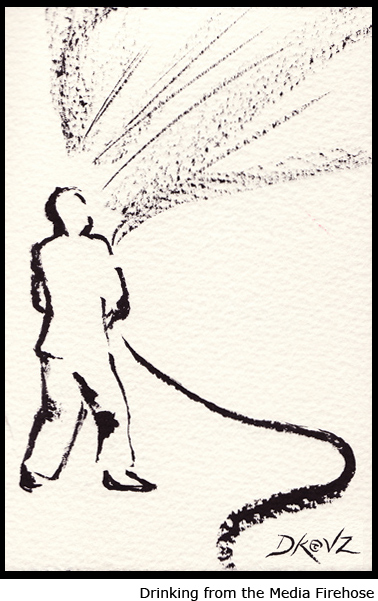Drinking from the Media Firehose

One way of viewing the discussions about content generation at Stanford’s weekend Legal Futures Conference is a struggle between two forces. One force wishes to use technology to make traditional media more productive without disintermediation, substitution or decentralization of content delivery. The other force is attempting to remove the throttle traditional media has on information distribution, while also revolutionizing the content delivery processes, mechanisms and values.
The principal factor in this struggle—the referee, metaphorically speaking—has been information technology. The seachange in remote communications brought about by the Internet has produced a seachange in people’s expectations. Traditional news media are in a mighty struggle with the transformative technological change imposed on media delivery mechanisms and processes.
Technology redefining “new” news
Bill’s father in World War II would walk a mile to hear Gabriel Heatter’s nightly broadcast of “news” about the war. Each trip he was concerned not only about what was happening in the war but also about whether the neighbor who owned the ABC battery driven radio would be home or would be listening to The Lone Ranger or Superman or whatever the other two competing broadcasters offered to compete in Mr. Heatter’s time slot. Bill sometimes trudged that two mile hike there and back and afterwards felt fully informed about “The War” even though Mr. Heatter’s “news” related to events that occurred three to six months earlier. What a distance has been traveled.
Technology reshaped the audience’s expectations. Now three to six month old “news” is not news anymore—it is “history.” News is what happened hours ago, minutes ago, what is developing right now. Now we not only hear what bomb has been exploded in the last five minutes but also see it. In fact, we can see it on numerous channels. It is a competitive sport for media channels to beat the others to the punch if by minutes or seconds.
Technology driving deficit of news content
Adding to the shrinking life of what is “news” is the proliferation of outlets and devices for media consumption. One would think there’s too much news (as economists say, a situation of “surplus”—supply exceeding demand). Actually, we argue, the modern media marketplace is in a chronic “deficit” state (demand exceeds supply). The demand for news content is huge and more discriminating than ever. Not only does news need to be super-recent and available 24/7, but it also needs to be highly personalized: matching the specific interests, ideology, hobbies, demographic, geography of the consumer. This presents a huge demand on the media sources—a demand that the professional media creators cannot meet. The end result is the on-going lowering of the threshold on what is considered “news-worthy”—we see more and more personal stories (like the Lacy Peterson saga) and eyewitness accounts (like CNN’s iReports) on CNN than ever before.
Today, there are billions of news broadcasters (TV channels, radio stations, hardcopy publications, and blogs). In fact the demand for content has so overwhelmed the capacity of professional creators that every newscast is unlikely to contain previously undisclosed news. To meet the demand, many news and entertainment purveyors have started borrowing YouTube, FaceBook and blogger content. They are outsourcing content creation by soliciting their readers, listeners and viewers for contributions. Those believing in the principles of evolution and not understanding the Zen principles must, at some point start wondering if they are a threatened species.
Interestingly, the alternative to traditional media presented by most blogs lies mostly in repackaging original content. They present commentary/opinions, largely based on original content from traditional media outlets. It is what Larry Lessig calls “remixing”—the process of creating discourse/commentary through creative mixing of the original content of others. Placing a reporter in Iraq or Ethiopia, or getting access to top presidential aides is still prohibitively expensive (both literally and figuratively) for the average blogger.
So while blogs proliferate commentary, in general they create much less original content than the traditional media. The media landscape is notoriously mercurial, but based on the laws of economics one may predict that in the coming years the balance of power can shift away from the commentators and channels, and towards the media content creators.
Search Engines and Remixing
The biggest “remixers” of content are the search engines. Google has built a media empire through remixing other people’s content and applying algorithmic “editorial judgment” in selecting the best search results for your search query (be it in web or news searches). Thanks to its superior business execution and the resulting position of industry leader, Google has done very well. But it is no surprise that the biggest potential challenge to Google’s dominance comes from the content side: Facebook and potentially eBay. Content may be on the rise again, even in the world of web portals.
Technology: source of challenges and opportunities
In the last few years professional content creators and their publishers have begun to recognize the scope of their dilemma and realize iPod and Tivo-like devices, with their time delay and mobility, may be digging their graves or opening great opportunities. Some who had an initial “fight” reaction are now beginning to think about how the Internet can instead extend their reach and increase their rewards. We think it is safe to say a majority of the attendees at the Legal Futures Conference fell into this group.
Coming next: Finding without searching
We believe the menu of content available to consumers will continue to grow exponentially. Technology will continue to make it easier to publish and disseminate information. As said in our last post, technology will also eventually devise a measure of content credibility. We can’t drink out of a fire hose but we also can’t wait a month to fill our bucket. Of course we want the content credibility to be high for good actors and low– for bad actors, but reliability is better brought about by transparency than by government regulation. Eventually, we are interested in decreasing the effort required to get precise, reliable information without killing the possibility of fall-out education (i.e. learning about something that is interesting and relevant to our life but is not substantially related to our current search). This is something that Google’s search model does not currently deliver, but someday somebody will.
Looking at the complex mess of the media world, it is hard to believe it now—but eventually simplicity will win over complexity.

Bill Fenwick & Drue Kataoka
With Contributions from Svetlozar Kazanjiev



What a fantastic post! Your questions and commentary are spot on. Thank you.